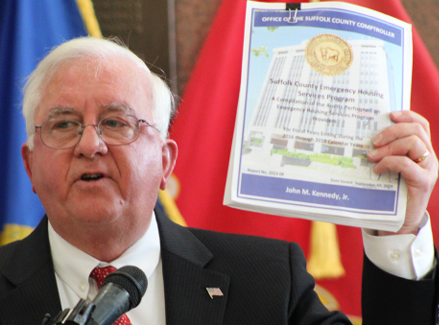
Previously Published in The Messenger
By Cait Crudden
A recent performance audit conducted by the Suffolk County Comptroller’s Office has raised serious questions about the transparency, fairness, and safeguards associated with the distribution of millions of dollars in opioid settlement funds. The audit, covering the period from July 1, 2021, through June 30, 2024, evaluated the grant award process for the Suffolk County Opioid Settlement Fund, which has the potential to distribute up to $197 million in litigation recovery funds.
The primary goal of the audit was to determine whether the grant application and award process was conducted in accordance with applicable New York State and County laws, and whether the process ensured accountability and protected taxpayer interests. Findings, however, indicate several troubling shortcomings.
One of the most notable findings in the audit was the exclusion of Suffolk County departments from consideration for funding during the first two rounds of awards. Even though several County departments are directly involved in providing services to those affected by the opioid crisis, none were granted funding in Rounds 1 or 2.
The report also highlighted potential ethical concerns surrounding the post-employment conduct of former county officials. Shortly after leaving office, the previous County Executive Steve Bellone (D-West Babylon) and his Chief of Staff were hired by organizations that received a combined $6 million in grant awards constituting nearly 17% of the total $36 million awarded in Round 1 alone. This raised significant concerns about the appearance of conflicts of interest in the grant selection process.
To address these issues, the Comptroller’s Office recommended that future funding rounds include consideration for County departments actively providing opioid-related services. This would ensure that taxpayer-funded resources are being used efficiently and are reinforcing existing public health infrastructure.
In addition, the audit recommended strengthening Section 77-6 of the Suffolk County Ethics Law to impose more robust post-employment restrictions for County officials. Such changes, the Comptroller argued, would reduce the risk of perceived or actual impropriety in future contract awards.
The audit comes amid a continuing opioid crisis that has devastated Suffolk County. In 2020 alone, more than 68,000 Americans died from opioid overdoses, an eightfold increase from 1999. Suffolk County has not been spared from this epidemic, with rising overdose deaths and strain placed on hospitals, first responders, schools, the criminal justice system, and behavioral health services.
In response, the Suffolk County Opioid Task Force was created in 2021 by Executive Order No. 2-2021. Its goal was to solicit input from healthcare professionals, law enforcement, and community leaders to guide the strategic use of funds obtained through opioid litigation settlements.
To date, the County has been awarded $36.2 million in Round 1 and $21.5 million in Round 2 of grants to a combined 76 nonprofit and private organizations. These awards were intended to support programs focused on prevention, treatment, and recovery services. As of December 31, 2023, the County still held approximately $104 million in its Opioid Abatement, Recovery & Support Fund. While the intent behind these awards is widely supported, the audit revealed significant concerns regarding the execution of the process and a lack of oversight.
The audit found that some aspects of the grant award process did not comply with New York State Open Meetings Law, suggesting that critical decisions may have been made without full transparency or public accountability.
“As stewards of the public trust, it is imperative that every dollar from the Opioid Settlement Fund is administered with transparency, fairness, and accountability,” said Suffolk County Comptroller John Kennedy (R-Nesconset). “Our audit findings highlight both the progress made and the critical areas in need of reform. We urge County leadership to implement these recommendations to ensure these vital resources are directed to the communities and individuals most impacted by the opioid crisis.”
County officials, legislators, and community stakeholders are now reviewing the audit’s findings, and calls are growing for reforms to ensure that future distributions of opioid settlement funds are not only effective but also fair, transparent, and above reproach.

